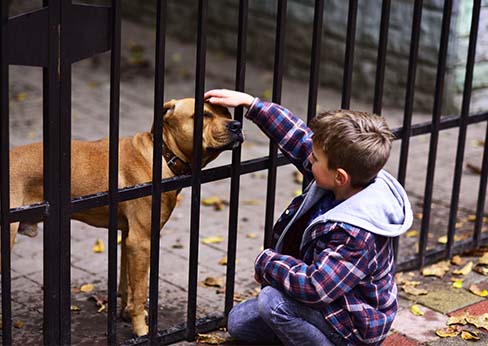Those unfamiliar with shelter dogs tend to associate the animals with a lower status compared to their purebred brethren. This status is based on the impression that the dogs were sheltered because of an issue with their previous homes whether it’d be behavioral or social. Regardless, this ‘baggage’ could not be farther from the truth.
“So, when adopting a pet from a shelter there is a misconception that you’re getting the dog’s problems. Whereas what you’re really getting is this warm little body that you have the ability to mold into whatever it is that you and your family want. We can really take advantage of the fact that these are dogs that maybe haven’t had the easiest of times and now maybe even they’ll be more grateful for the fact that there is a new family here that sort of to really embrace all their…they are quirks, their personalities. All of the good and the bad.” – Melody Stone, adoption supervisor at Seattle Humane
Top reasons dogs are surrendered to shelters:
Animals enter shelters for a variety of reasons. Most animal surrenders (when owners release their animals to shelters) occur because their owners are trying to better their animal’s life, not because of any fault of the animal.
Moving (7%):
Moving is hard enough for humans. For animals, serious moves can be utterly disruptive. Moving animals also come with additional costs and logistics, especially if airfare is involved. As sad as it is, placing an animal in a shelter is sometimes in its best interest.
Landlord not allowing pet (6%):
Not every apartment or house is pet-friendly. Sometimes, housing that doesn’t allow pets is the only feasible option for owners and their families, and pets are surrendered to shelters as a consequence.
Cost of pet maintenance (5%):
There are a lot of considerations potential owners should make before adopting. However, between food, training, toys, medication, and other miscellaneous costs, new owners sometimes underestimate their own financial capabilities and are forced to surrender their animal.
Too many animals in the household (4%):
Owners who already have dogs or cats in their house may decide to adopt another animal. Although this often works out well, the new animal may not get along with the preexisting animals in the house, or the additional responsibility may be too much for the owners. In either case, the newly adopted animal may be surrendered to a shelter. Additionally, owners who fail to spay or neuter their dog may unexpectedly end up with puppies in need of placement.
The owner having personal problems (4%):
Owners need to be able to take care of themselves in order to take care of an animal. One’s personal life may get in the way of caring for a pet, and the owner may surrender their animal in hopes that it will be properly cared for with another owner.
Inadequate facilities (4%):
Different animals have different environmental needs. Before adopting, owners should research whether their current living situation can satisfy those needs. Smaller dogs, for example, can more easily adjust to living in a smaller apartment than larger ones. An owner might be well-intentioned, but they may decide to surrender their animal if their current living situation does not best support the animal’s well-being and happiness.
Having no time for pet (4%):
Life rarely goes as planned. Pets require a considerable amount of attention, and changes with work or family can prevent owners from giving their pets the lifestyle they deserve. Surrendering to a shelter offers an animal a second chance at a happy life.
Pet illness(es) (4%):
Pets come with a price, and their medical bills can be just as expensive as those of humans. Owners may surrender their animals because of an inability to pay those expenses, whether they be financial, time, or attention.
Biting or behavioral issues (3%):
Although no dogs are aggressive by birth, poor upbringings or training may contribute to aggressive behavior. Dogs who bite a member of their family may be surrendered to shelters as a way to minimize the risk of a repeat offense.
With the exception of the 3% of dogs who enter shelters because of biting or behavioral issues, every other reason on this list reflects a human’s inability to properly care for their pet, not because of an issue with the pet itself. So, when looking to adopt from a shelter, there is very little to suggest that a shelter animal would be any more difficult to raise than one from a breeder.

Final thoughts:
To be clear, not all shelter dogs are surrendered by their owners. Over half of all shelter dogs are brought in as strays. However, time as a stray does not mean that those dogs will be any more aggressive or have more health issues than surrendered dogs. The ASPCA even notes that an animal’s current medical history and behavior are significantly more important than its history, and that shelter staff are typically very aware and transparent about an animal’s behavior in shelters.
At the end of the day, shelter dogs are simply looking for a loving companion and a new family. Giving a shelter dog a chance can save its life and open up space in shelters for another dog to seek adoption. A dog may have been unlucky with its previous owner, but that does not mean it carries over any baggage. Rather, it’s just on round two in a search to find a forever home.
Special thanks to:

Seattle Humane: Saving Lives, Completing Families
Seattle Humane promotes the human-animal bond by saving and serving pets in need, regardless of age, ability, circumstance, or geography. Seattle Humane is Puget Sound’s leader in animal adoption, education, and welfare. Their top priority is to connect animals in need of rescue with the people who will love them. Through their outreach, advocacy, and services we strive to ensure that animal companionship is accessible to all.





